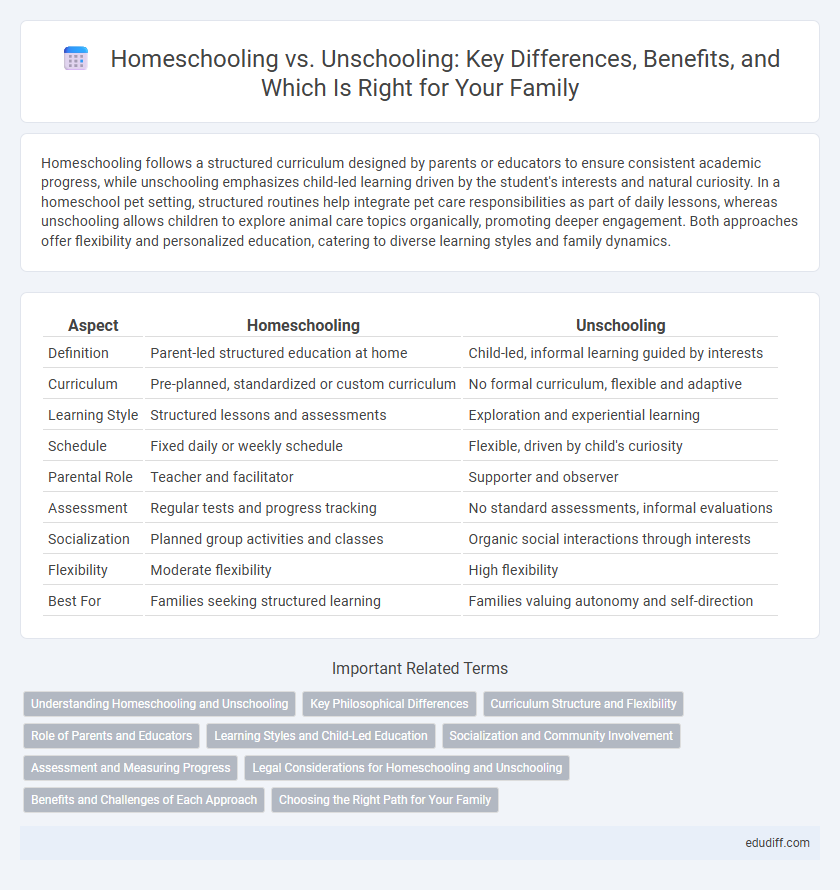Homeschooling follows a structured curriculum designed by parents or educators to ensure consistent academic progress, while unschooling emphasizes child-led learning driven by the student's interests and natural curiosity. In a homeschool pet setting, structured routines help integrate pet care responsibilities as part of daily lessons, whereas unschooling allows children to explore animal care topics organically, promoting deeper engagement. Both approaches offer flexibility and personalized education, catering to diverse learning styles and family dynamics.
Table of Comparison
| Aspect | Homeschooling | Unschooling |
|---|---|---|
| Definition | Parent-led structured education at home | Child-led, informal learning guided by interests |
| Curriculum | Pre-planned, standardized or custom curriculum | No formal curriculum, flexible and adaptive |
| Learning Style | Structured lessons and assessments | Exploration and experiential learning |
| Schedule | Fixed daily or weekly schedule | Flexible, driven by child's curiosity |
| Parental Role | Teacher and facilitator | Supporter and observer |
| Assessment | Regular tests and progress tracking | No standard assessments, informal evaluations |
| Socialization | Planned group activities and classes | Organic social interactions through interests |
| Flexibility | Moderate flexibility | High flexibility |
| Best For | Families seeking structured learning | Families valuing autonomy and self-direction |
Understanding Homeschooling and Unschooling
Homeschooling involves a structured curriculum tailored by parents or educators to meet academic standards, while unschooling emphasizes child-led learning driven by interests and experiences. Understanding these approaches requires recognizing homeschooling's focus on planned education and unschooling's flexibility in fostering natural curiosity. Both methods provide personalized learning environments but differ significantly in organization and instructional control.
Key Philosophical Differences
Homeschooling typically follows a structured curriculum designed by parents or educators, emphasizing academic goals and measurable progress, while unschooling prioritizes child-led learning driven by individual interests and experiences. The key philosophical difference lies in control: homeschooling maintains parental guidance and planned lessons, whereas unschooling trusts the natural curiosity and autonomy of the child to direct their education. This distinction reflects broader views on education's purpose--homeschooling aligns with traditional academic achievement, and unschooling embraces experiential learning and intrinsic motivation.
Curriculum Structure and Flexibility
Homeschooling typically follows a structured curriculum with set goals and schedules, providing a consistent framework for academic progress. Unschooling offers greater flexibility by allowing learners to pursue interests organically, adapting educational content to the child's natural curiosity and pace. This contrast in curriculum structure highlights the balance between organized learning objectives in homeschooling and the self-directed, interest-driven approach of unschooling.
Role of Parents and Educators
In homeschooling, parents typically take an active, structured role in designing curricula and delivering lessons, ensuring alignment with educational standards. Unschooling empowers parents and educators to act more as facilitators and mentors, allowing children's interests to guide the learning experience. Both approaches emphasize parental involvement, but homeschooling relies on direct instruction while unschooling promotes child-led exploration.
Learning Styles and Child-Led Education
Homeschooling typically follows a structured curriculum tailored to various learning styles, ensuring consistency across subjects and skills development. Unschooling emphasizes child-led education, allowing children to explore topics based on their interests, promoting intrinsic motivation and personalized learning experiences. Both approaches recognize the importance of adapting to individual learning preferences, but unschooling prioritizes autonomy and flexibility over formal instruction.
Socialization and Community Involvement
Homeschooling often incorporates structured socialization opportunities through co-ops, sports, and local classes, fostering peer interaction within organized settings. Unschooling emphasizes organic social experiences driven by the child's interests, promoting community involvement through diverse, real-world environments such as volunteering, clubs, and cultural activities. Both approaches offer unique pathways to social skills development and community engagement, tailored to individual learning styles and family values.
Assessment and Measuring Progress
Homeschooling typically involves structured assessment methods such as quizzes, standardized tests, and formal evaluations to measure student progress and ensure adherence to curriculum standards. Unschooling relies on observational assessment, portfolio reviews, and real-life achievement indicators, emphasizing personalized learning growth over traditional grading. Both approaches prioritize tracking development but differ fundamentally in the tools and criteria used to assess educational outcomes.
Legal Considerations for Homeschooling and Unschooling
Legal considerations for homeschooling vary by state, requiring parents to comply with specific regulations such as mandatory notifications, curriculum standards, and record-keeping. Unschooling, often less structured, may face stricter legal scrutiny due to its flexible approach, necessitating parents to understand local education laws to avoid truancy issues. Ensuring compliance with state-specific homeschooling statutes is critical for both homeschooling and unschooling families to safeguard their educational rights.
Benefits and Challenges of Each Approach
Homeschooling offers structured curriculum control and tailored pacing, allowing parents to align education with their child's learning style, but it can demand significant time and resource investment. Unschooling promotes self-directed learning and fosters creativity by encouraging exploration based on the child's interests, yet it may pose challenges in meeting standardized educational benchmarks and ensuring comprehensive subject coverage. Both approaches enhance family bonding and adaptability, but require careful planning to balance freedom with academic goals.
Choosing the Right Path for Your Family
Homeschooling offers a structured curriculum tailored to your child's academic needs, while unschooling emphasizes child-led learning through real-life experiences and interests. Evaluating your family's educational goals, your child's learning style, and your capacity to provide guidance helps determine the optimal approach. Both methods require commitment and flexibility to create a supportive learning environment that aligns with your family's values.
Homeschooling vs Unschooling Infographic

 edudiff.com
edudiff.com